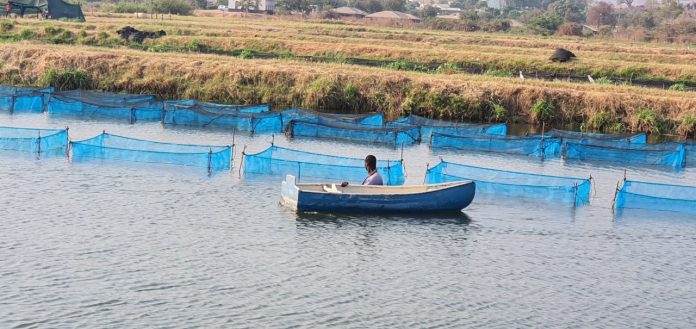Story by Tambaoga Gora
GOVERNMENT has revealed plans to turn the fisheries and aqua culture industry into a US$1 billion economy by 2030 in line with the national vision of an upper middle-income society.
The Deputy Minister of Lands, Agriculture, Fisheries, Water and Rural Development, Honourable Davis Marapira was in Kariba this Wednesday for a tour of entities that are into the fishing and aqua culture business.
His first port of call was Padenga Holdings Crocodile Farm, which is producing more than 42 000 skins a year and making a turnover of US$30 million annually, while also employing at least 600 permanent workers.
“The Padenga stable has three crocodile farms namely Kariba Crocodile Farm, Nyanyana and Ume. We do 42 to 46 000 crocodile skins per year, employing 858 people across the three operations and our mission is to produce quality crocodile skins for the luxury houses throughout the world,” said Padenga Holdings operations executive, Mr Charles Boddy.
The company is grateful to the Education 5.0 model after the Harare Institute of Technology came up with a granulator, which they had failed to get on the international market.
“We had a challenge with a shape of the food, so the Harare Institute of Technology developed a customised machine where they convert our food into balls at the right size for the crocodiles and I must tell you that we looked over the world to find a machine and the guys developed it for us from zero and it’s working brilliantly,” added Boddy.
Crocodile Producers Association of Zimbabwe chairperson, Mr Jimmyson Kazangarare drew attention to challenges bedevilling the crocodile farming sector.
“We have challenges like how we are being charged on water, we are charged US$30 per mega litre, while farmers who are doing irrigation are only charged a dollar per mega litre, but they consume all the water unlike us who discharge the water after using it. We have also the issue of Chewore where we used to collect eggs but now we are not able to collect because somebody now claim ownership of the area.”
The Deputy Minister of Lands, Agriculture, Fisheries, Water and Rural Development, Honourable Davis Marapira also toured companies that produce fingerlings challenged them to find innovative ways of expansion in line with new industrial targets.
“We are encouraging them to grow because we want to grow this fisheries and aqua culture into a billion-dollar economy so that we go hands in hands with the President’ s vision of an upper middle class society by 2030 and these are low hanging fruits. So as government, we should be able to assist because we want growth they also need assistance from our colleges to do more research,” he said.
On another positive note, Padenga Holdings has been registered as an independent power producer feeding 1.2 megawatts into the national grid with plans now at an advanced stage to expand its solar plant to produce 2.5 megawatts.





